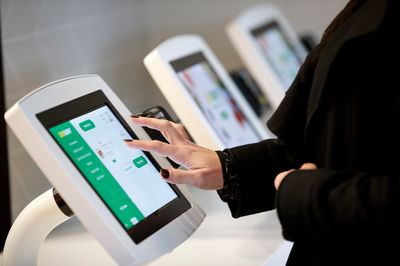Subway touch-screen ordering kiosks
-
Company is putting self-ordering kiosks in restaurants
-
Sandwich chain debuted revamped mobile app about a month ago
Subway Restaurants, facing one of the worst slumps in its history, is hoping to win back customers by losing its low-tech image.
The sandwich chain is introducing touch-screen ordering kiosks and a new mobile app — a bid to catch up with places like Panera Bread Co., which have credited technology with helping fuel sales. Subway is even testing dedicated pickup areas for mobile orders, shaking up the five-decade-old format of its restaurants.
It’s a major overhaul for a chain that hasn’t been known for its technological prowess. Until about a decade ago — when Subway was still booming — its customer-loyalty program relied on sticking stamps on paper cards. But these days, Subway is reeling from a three-year U.S. sales decline and fast-food competition is tougher than ever. That’s put pressure on the chain to be quicker and more convenient.
“It’s really a vision and strategy in how we want to evolve,” Carman Wenkoff, Subway’s chief information and digital officer, said in an interview. “Customers are demanding a more complete experience.”
The company, which has more locations than any other restaurant chain, also is adding digital menu boards and bringing Wi-Fi to some locations. The move is a response to competition on several fronts. Traditional fast-food chains are upgrading their equipment and embracing more natural ingredients, robbing Subway of its edge in the healthy-eating arena. Mom-and-pop eateries and prepared meals from grocery stores also are taking market share.
Three-Year Drop
Subway’s U.S. sales fell 1.7 percent last year to $11.3 billion, marking the third straight annual decline, according to research firm Technomic. For all restaurants, sales increased 3.9 percent in 2016.
Earlier this year, Subway confirmed that it was closing hundreds of locations, marking the biggest retrenchment in its history. The company, based in Milford, Connecticut, was founded almost 52 years ago by Fred DeLuca and Peter Buck.
IBISWorld, another research firm, is projecting an additional year of negative U.S. sales for Subway in 2017, pointing to the encroachment of nimble rivals like Jersey Mike’s.
Chipotle and Five Guys also have lured away Subway customers with “sleeker layouts, shrewd marketing touting locally sourced ingredients and fast turnover,” according to the firm. And a historic bout of food deflation has made grocery-store meals relatively cheaper, adding to the competition.
So far, Subway is testing about 50 of the new self-ordering kiosks. The technology allows customers to walk in and tailor their meals with more accuracy. Digital menus, meanwhile, are available in hundreds of stores. They can be changed instantly without having to print new signs and laboriously replace them.
Mobile App
On average, each location will eventually have about three kiosks, Wenkoff said. The new mobile app, which includes a sandwich-customizing feature, is available now in about 26,000 of the chain’s 27,000 U.S. stores. It was introduced about a month ago.
Subway also is testing out third-party delivery with providers such as GrubHub Inc., Postmates Inc. and DoorDash Inc. But it hasn’t teamed up with any of the services on a larger scale.
The upgrades require buy-in from franchisees, which own all of Subway’s locations. Though the company is helping pay for the changes, independent owners will bear much of the cost.
“We are investing heavily,” Wenkoff said. “We’re also asking the franchisees to put some skin in the game. Our franchisees are with us 100 percent.”
The chain also is testing out remodeled restaurants in eight areas in the U.S., Canada and England.
But the mobile ordering is perhaps the most critical update. With the proliferation of services like Apple Pay and Starbucks Corp.’s smartphone app, diners are increasingly looking to get food without fumbling with their wallets.
“Mobile devices are attached at the hip to pretty much all our customers these days,” Wenkoff said. “It’s all about convenience.”

